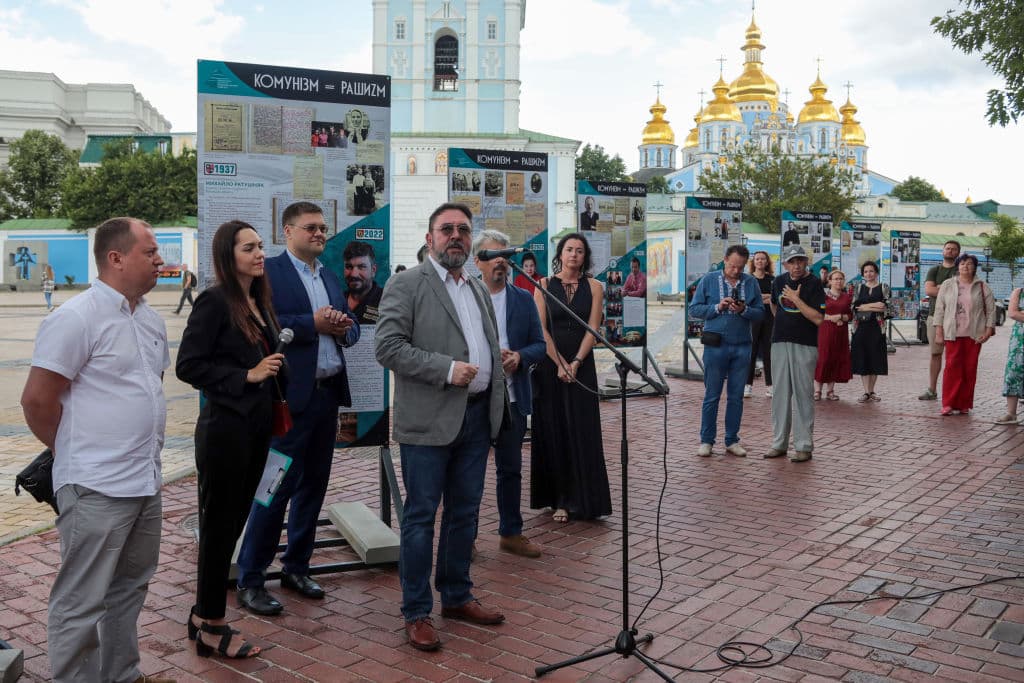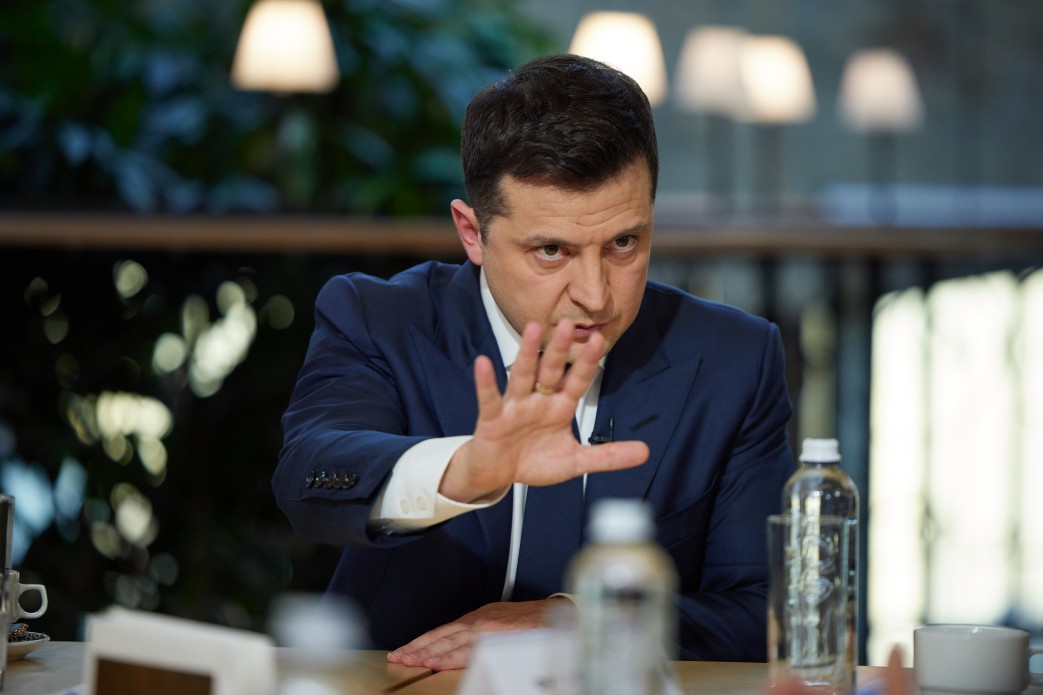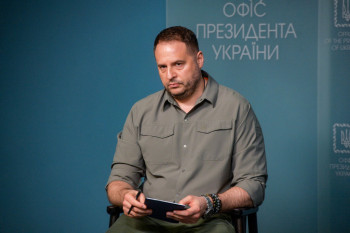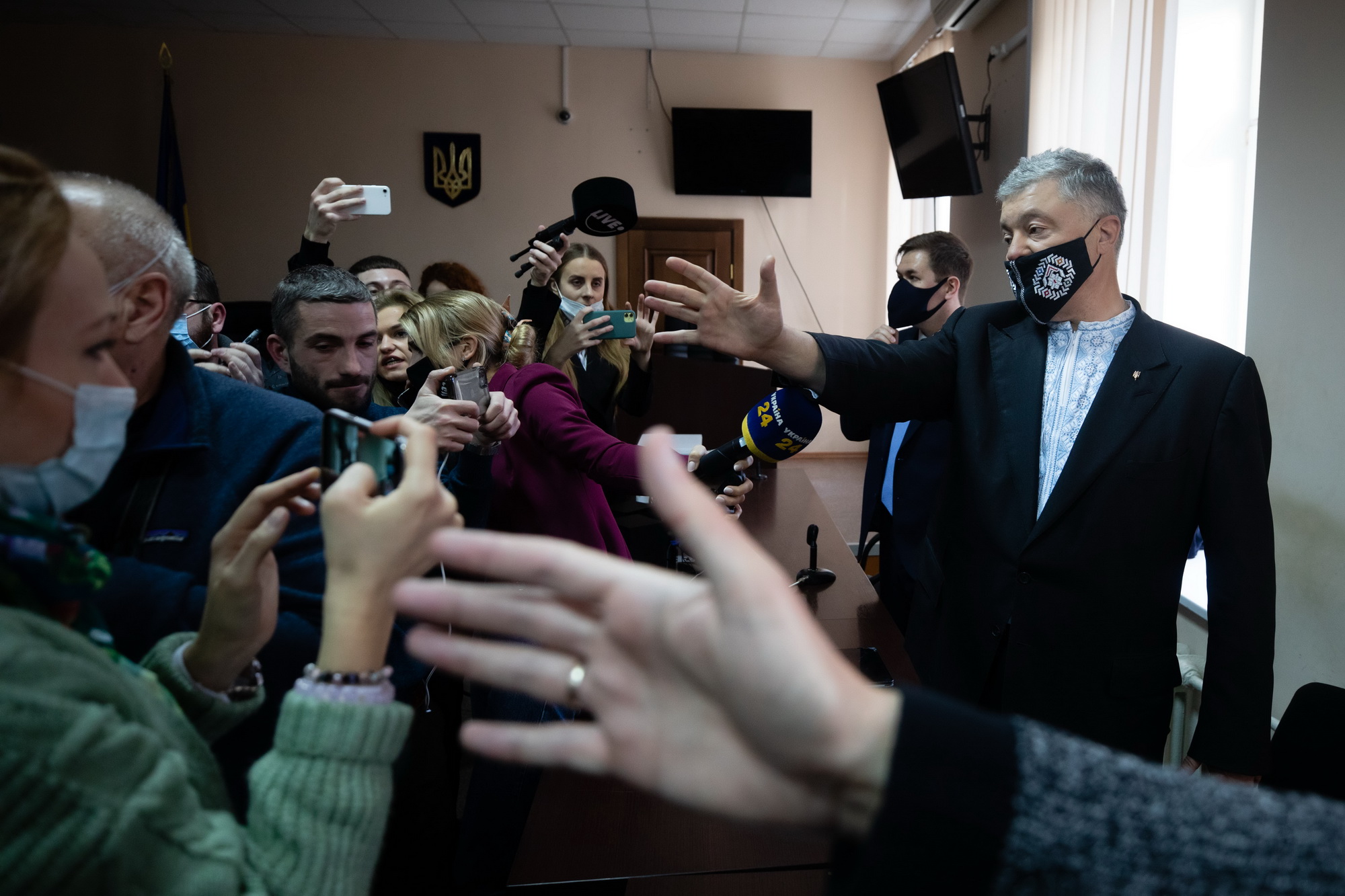New media law: Tool to fight Russian propaganda or censorship attempt?

Ukraine’s new media law, signed by President Volodymyr Zelensky in December, has triggered a major controversy.
The law expands the powers of the media regulator, the National Council for Television and Radio. Specifically, it gives it the authority to block some media outlets without a court ruling.
Its supporters argue that Ukraine needs a strong regulator to fight Russian propaganda and resist Russian aggression.
But critics say that the media law can be used to censor pro-Ukrainian media critical of the incumbent government.
The National Council for Television and Radio is fully controlled by Zelensky and cannot be considered an independent regulator, opponents of the law argue.
Moreover, the Ukrainian authorities have recently cracked down not only on Russian propaganda but also on opposition media that have a consistently patriotic policy – such as channels affiliated with ex-President Petro Poroshenko. This creates the risk that the media law will be used to destroy media independent from the authorities, critics say.
The Ukrainian authorities also argued that the law aims to bring Ukrainian legislation in line with EU law.
Media reform is one of the EU's conditions for starting negotiations on Ukraine's accession to the bloc. The EU wanted Ukraine to adopt legislation to fight the influence of vested interests on the media, ensure a competitive media market and introduce an independent regulator.
Critics of the law say that the EU aspect was used as a façade for expanding the regulator’s powers and that the law does not meet EU conditions anyway.
Mykyta Poturayev, the main author of the media law and head of parliament’s information policy committee, denied the accusations.
“The industry is never satisfied with the regulator’s actions,” he told the Kyiv Independent.
Harsh criticism
Before its adoption, the law had faced a lot of criticism.
In July the European Federation of Journalists urged the Ukrainian authorities to withdraw the draft media law. The federation said that the law contained "many provisions that are contrary to European values."
The Committee to Protect Journalists said in July that the law "threatens to restrict press freedom in the country and would move it away from European Union standards."
In September Ukraine's National Union of Journalists said that the law was "the biggest threat to free speech in (Ukraine's) independent history." The union added that the adoption of the law could "cast the shadow of a dictator" on Zelensky.
The President’s Office did not respond to a request for comment.
Two media watchdogs – Detector Media and the Institute of Mass Information – argue that the law has improved since the initial version, which envisaged more draconian restrictions.
Ricardo Gutierrez, general secretary of the European Federation of Journalists, also agrees that the final version is less dangerous.
“Of course, the law has been improved. In July, we demanded that the law be withdrawn altogether,” he told the Kyiv Independent. “Today, we are just asking that journalists' representative organizations… be involved in the committees working on the implementation of the law.”
But the current version of the law is also considered dangerous by many.
"On the one hand, the legislative regulation of online media is long overdue," Sevhil Musayeva, chief editor of online newspaper Ukrainska Pravda, told the Kyiv Independent. "On the other hand, the current version of the law strengthens state control over information and may pose a risk to free speech in such a young democracy as Ukraine."
She also said that "the National Council for Television and Radio has made politically motivated decisions many times before, and this risk exists today as well."
Power to block media
One of the tools that can be used for censorship is the regulator’s ability to block and shut down media outlets, critics say.
Online media registered by the state cannot be blocked by the National Council for Television and Radio. But they can be blocked by a court after the fourth major violation.
Meanwhile, non-registered online media with identified owners and journalists can be blocked by the regulator without a court ruling for 14 days after the fifth violation. After that a court ruling would be needed to block them.
Anonymous media that do not identify their owners and journalists can be blocked by the regulator permanently without a court ruling.
Reasons for banning media include incorrect information about the owners, "discriminatory" materials, promoting drugs, positive coverage of Russian aggression, and displaying Nazi or Communist symbols, according to the law.
“One of the measures we are contesting is, for example, the possibility of suspending an 'unregistered' media outlet for a fortnight, without having to go to court, which can result in the permanent disappearance of the media outlet,” Gutierrez said. “This kind of measure does not comply with European legal standards of media freedom.”
Serhiy Tomilenko, head of Ukraine’s National Union of Journalists, told the Kyiv Independent that previously the regulator had to prove that a violation had occurred before punishing a media outlet, and it was a lengthy and difficult process.
Under the new law, the authorities can immediately punish or block a media outlet, and it will have to prove its innocence afterwards, Tomilenko said.
The first version of the law was even more radical. The initial draft envisaged blocking both registered and non-registered online media without a court ruling for a month.
Print and online media
The law expands the media regulator's powers. Previously the National Council for Television and Radio had the authority to supervise only radio and television but now it will also oversee print and online media.
"(The law) proposes to give arbitrary and disproportionate regulatory powers to the national regulator, which would have authority not only over audiovisual media, but also over print and digital media," the European Federation of Journalists said in July.
Tomilenko said that TV channels and radio stations regulated by the National Council for Television and Radio are often afraid that their licenses could be annulled. That is why they are reluctant to criticize the authorities – including criticism of the media law promoted by the government, he added.
In contrast, there had been a free discussion of the media law and other issues by print and online media that were not regulated by the council, he said. Since the council is going to regulate them as well, there is the risk that they will be afraid too, according to Tomilenko.
“In civilized countries, the media must not be afraid of the regulator,” he said.
A politically biased regulator?
According to Ukraine's Institute of Mass Information, the law is likely to ensure the incumbent authorities’ control over the National Council for Television and Radio. Its members are appointed by Zelensky and the Ukrainian parliament, where his party has an absolute majority.
Tomilenko also argued that the National Council for Television and Radio is completely controlled by Zelensky, and independent journalists are not represented on the council.
“The coercive regulation envisaged by the bill and in the hands of a regulator totally controlled by the government is worthy of the worst authoritarian regimes. It must be withdrawn. A state that would apply such provisions simply has no place in the European Union,” Gutierrez said in July. “Media regulation should be implemented by a body independent of the government and its objective should be media independence, not media control."
Since the law does not envisage guarantees of the council’s independence, it appears to contradict the EU requirement for an independent media regulator.
Poturayev, the main sponsor of the media law, argued that the National Council for Television and Radio would not be politicized because it must be chosen in competitive contests organized by the president and parliament, according to the law.
However, civic activists have criticized numerous contests for state jobs in Ukraine as rigged and politicized, with a competitive bidding procedure used as a façade for shady political appointments. These include contests for the State Investigation Bureau, the Economic Security Bureau, prosecutors’ jobs, and the Constitutional Court.
Comparison with EU media laws
Poturayev claimed that the media law is “based on the most liberal model,” and that some experts have allegedly criticized it for being “too liberal.”
He also argued that some regulators in Europe also have the right to suspend media outlets without a court ruling.
Gutierrez disagreed.
“This law is not so liberal. Nowhere in Europe is there an independent regulator with such strong powers over all media (broadcast, print and online),” he told the Kyiv Independent. “It is true that not all audiovisual regulators are independent everywhere in Europe, but we also denounce countries where media regulatory bodies are not independent from governments.”
Gutierrez said that Belgium, Denmark, Estonia, France, Germany, Ireland, Portugal, Sweden, and the Netherlands have strong guarantees of media independence.
Others – such as Albania, Serbia, Turkey, Hungary, Malta, Poland, Slovenia, and Bulgaria – have weaker guarantees, Gutierrez said.
“Why haven't the Ukrainian authorities followed the example of the European states that are most protective of media independence, with regulatory bodies that include civil society, independent experts, journalists' representatives and not just representatives of the dominant party?” he added.
No dialogue with media
One of the complaints against the law is that there was no dialogue with the media community about it, and most media were against it, Tomilenko said.
“The Committee to Protect Journalists has been concerned about the media law because of two reasons: first, the lack of transparency in its discussion and the fact that journalists and media organizations were not involved in the process as actively as they should have been,” Gulnoza Said, the committee’s program coordinator for Europe and Central Asia, told the Kyiv Independent.
Gutierrez said that media laws “cannot be passed without involving journalists' representative organizations.”
“We believe that this is a reasonable request and we would not understand a refusal by the Ukrainian authorities,” he added. “It would send a very bad signal to the European Commission, which is following this issue very closely.”
Wartime measure?
Proponents of the law argue that the regulator needs strong powers to fight Russian propaganda.
Lyudmyla Pankratova, a media lawyer, told the Kyiv Independent that she believes there must be a balance between the freedom of speech and security. She thinks the media law strikes the right balance.
However, the media law itself is intended as a permanent feature, not as an extraordinary wartime measure.
“We do not wish to assess the situation of freedom of expression while the country is at war. We have no lessons to give,” Gutierrez said. “But we do want to do everything we can to ensure that once victory is secured and peace returns, the citizens of Ukraine have access to pluralistic, independent and ethical information.”
He said that the law “has been adopted for the future” and therefore “must meet the requirements of a peacetime democracy.”
The Committee Protect Journalists argued that the war should not be used as an excuse for cracking down on free speech.
“The war should not become the pretense to limit press freedom and journalists' access to war zones,” Said said. “Ukrainian people should be able to choose the source of information they trust — be it TV Marathon or other media outlets.”
TV marathon
In February 2022 the authorities used martial law to merge all major news channels into one channel under state leadership, called the TV Marathon.
While many supported the measure as a way to prevent a panic during the initial stage of the Russian full-scale invasion, the utility of the Marathon’s continued existence has been questioned.
Critics also consider the Marathon to be a threat to the freedom of speech since even patriotic, pro-Ukrainian TV channels are not allowed to operate independently.
Tomilenko argued that the quality of the Marathon had fallen substantially.
The marathon also represents only the incumbent government’s viewpoint, and opposition opinions are not represented.
“On the marathon, we’re hearing only the thoughts of those who support the media law,” Tomilenko said. “Critics are not represented. This tells us how much the (authorities) are devoted to freedom of speech.”
He argued that it would make sense to resume the independent operation of TV channels instead of the Marathon.
“We can understand the call to pool all the country's media capacity, especially to respond to the propaganda efforts of the Russian authorities,” Gutierrez said. “But this media coalition cannot be sustained in peacetime.”
He argued that, under European standards, the public should have “access through television and radio to impartial and accurate information and to a range of opinion and comment reflecting the diversity of political outlook within the country.”
“A situation whereby a powerful economic or political group is permitted to obtain a position of dominance over the audio-visual media and thereby exercise pressure on broadcasters and eventually curtail their editorial freedom undermines the fundamental role of freedom of expression in a democratic society,” Gutierrez said.
Crackdown on media
Concerns about the possible use of the media law as a tool of censorship are also based on the past record of crackdowns on free speech.
In April 2022 the National Security and Defense Council banned three opposition channels – Pryamy, the Fifth Channel and Espresso – from broadcasting. They say the decision was illegal.
Pryamy and the Fifth Channel used to be owned by ex-President Petro Poroshenko, Zelensky’s main opponent, and are now controlled by a holding company owned by Poroshenko allies. Espresso is owned by Mykola Knyazhytsky, a lawmaker from Poroshenko’s party.
Oleksiy Danilov, secretary of the National Security and Defense Council, attributed the ban to “security reasons.” It is not clear what security reasons were meant since the three channels did not broadcast pro-Russian propaganda and are consistently patriotic.
Mykhailo Podolak, an advisor to Zelensky’s chief of staff Andriy Yermak, lashed out at the three channels for promoting Poroshenko, calling this “narcissism.”
Oleksandr Korniyenko, a deputy speaker of the parliament, said that the negotiations on the three channels joining the TV Marathon had failed because they wanted to broadcast their own content in addition to the marathon. Espresso denied taking part in such talks, however.
Meanwhile, Poturayev argued that the three channels were not included in the TV Marathon because there are more broadcasters than hours available. He suggested splitting the marathon into two channels and including Espresso, Pryamy and the Fifth Channel in one of them.













